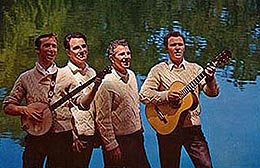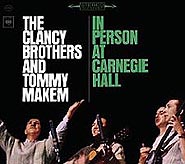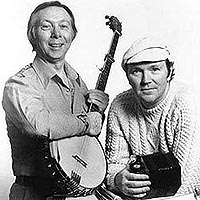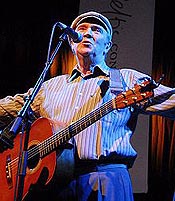 Liam Clancy (The Clancy Brothers)
Liam Clancy (The Clancy Brothers)
'My Glory Was I Had Such Friends: An Interview with Liam Clancy'
Back on St. Patrickís Day, 1963, an Irish folk album was recorded that became an instant classic and a touchstone for all Irish music that followed. That album was ĎThe Clancy Brothers & Tommy Makem In Person at Carnegie Hallí It was a stunning document that blended music, theatre, verse and humour.
The influence of that album is almost impossible to calculate. It did for traditional folk music what The Beatles did for pop with ĎSgt Pepperísí and Miles Davis did for jazz with ĎKind of Blueí. Many of the songs from that album have gone on to be performed by artists all around the world, and it solidified the groupís reputation as leading purveyors of Irish traditional folk.
What is not so widely known is that the LP that was subsequently released contained only a quarter of the material that was actually recorded. The rest of that nightís set has been hidden away in Columbia Records vaults for 45 years.
Until now that is, as this month sees the release of ĎThe Complete1963 Concertí, a two CD set that contains 47 tracks of music, verse and banter. This new release gives the listener the experience of what it must have been like to sit there through a full two hour concert with a packed audience and a group at the height of their powers.
Liam Clancy is the only surviving member of the four piece group that played that famous night; and I had the opportunity to ask him about the new release.

How proud are you of this reissue? "I wouldnít say proud of it so much. I went through all that at the time. It was series of concerts at Carnegie Hall and it was all very exciting, and the recording of that was quite an event. The thing that intrigued me about getting the original recordings and listening to them alone at night was that it really got to me. What with the others being gone now, it was very emotional to be thrown back into it."
"Listening to those recordings, it was very intense, very emotional to be thrown back into the middle of the four of us on stage and the excitement of the night; I was brought right back there. And yet, as I listened to the introductions and the chat between the songs it became clear it was from a different era. What is really intriguing is not so much the songs themselves as the mention of Jack Kennedy in the White House, it is more like a social documentarily. It was a very different time."
Playing Carnegie Hall was very much the pinnacle of an artistís profession; did it feel like a momentous occasion? "What you have to remember about Carnegie Hall is that it was the prestige of the place, itís not actually that big inside, itís about half the size of the Royal Albert Hall. But, at the time, sound equipment hadnít been as developed as it is now and you couldnít do great big outdoor concerts. So, playing Carnegie Hall was about as big and prestigious as you could get."
"We played there twice a year for fifteen years. It was always a highlight of our year. It was like a punctuation mark in our touring year. Weíd go off to Australia and New Zealand but there was always a mystique about playing Carnegie Hall. I think it was because we had such a special following in New York who would make a point of seeing us there."

Why do you think it has taken 46 years for this material to be made available? "Iím delighted that after all this time those tapes hiding away in the vault are coming out to see the light of day. There has been a great change of philosophy at Columbia Records over the years. At that time, the head of Columbia was a chap called Goddard Lieberson, and he believed that music should be made available to the public that reflected all the different musical tastes and musical genres."
"Shortly after the concert was recorded Goddard Lieberson promoted Clive Davis to be president of the record company and he had a very different philosophy. His idea was to mould peopleís tastes in music. So, any Ďproductí in the catalogue that sold less than 100,000 Ďunitsí was discontinued. That philosophy continues to this day, and itís one that I find unpleasant as you do not get the diversity of music that you used to get in the 60s."
Listening to the CDs did you have to really work on the vocal harmonies, or did they come naturally? "Ah, we never worked on anything as far as I remember," he laughs. "We sung whatever came to mind and it could change from night to night. The only thing we did work on, especially for Carnegie Hall, we worked on the entire concert as if it was a play. The individual songs were not as important to us as the way the show would build. We had all been involved as actors doing Shakespeare, Yeats, and Eugene OíNeill. I had spent two years as the lead actor at the Poets Theatre in Harvard."
"So we were thoroughly involved in how an evening was constructed; the peaks, the valleys and the climaxes. Unfortunately, when the record was released the songs didnít mean as much as they had been taken out of context. After listening to the original test pressings and playing it for family and friends I never listened to it again for forty five years. This is one of the reasons why it hit me so hard when I did finally hear the complete recordings."
There are a lot of songs in your set, how on earth did you remember all the words? "I suppose thatís a gift," he laughs again. "I can still remember reams and reams of poetry in English, in Irish, itís just something that you either have an aptitude for or you donít. To me words mean everything in my life, they are my stock in trade, like bread and butter, Iím a romantic at heart, I didnít have to try to memorise them they just stuck in my mind. And at 73 I still can remember bits of plays and Shakespeare, poetry and songs."

You are still playing gigs; do you ever feel like retiring? "This is not the kind of work you retire from; itís a way of life. In fact Iíll soon be back in Ireland for a film Iíve been working on for three years, itís called ĎThe Yellow Bittern: the Life and Times of Liam Clancyí. Iím just releasing an album called ĎThe Wheels of Lifeí which is about to be released on the heels of the Carnegie Hall album and is packaged with a two hour documentary film."
"Also, thereís a film we just made last summer, in New York at The Bitter End, which is an old haunt of ours. I had my old friends; Odetta who died just recently, Eric Bibb who is the son of Leon Bibb, an old pal of ours from the sixties, Tom Paxton, another old pal who did some duets with me, and Shane McGowan who I propped up on stage to stop him falling off. We had a great old time. In the spring I will be doing a tour which will include the Opera House in Cork and the National Concert Hall in Dublin. So, we are keeping busy."
Lastly; what was the guitar you played at Carnegie Hall and do you still have it? "I canít remember, it was an old nylon string guitar if Iím not mistaken. I probably gave it away to a family member who was just starting out. People often asked me about my guitar style of putting my guitar up under my chin and thumping at it as loud as I could; well itís because there were four voices and very often just one microphone and in order to make the guitar heard at all I had to keep it up as close to the mic as possible. Things were very different back then."
Interviewed by: Peter 'taB' Walker
www.liamclancy.com
www.legacyrecordings.com
Back To Archives

